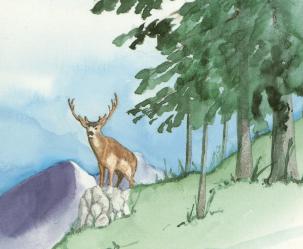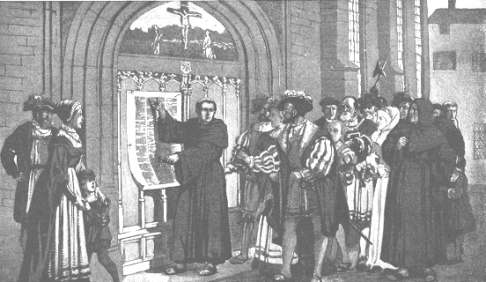The church in the wilderness
|
|
|
| .1
¶ I am the rose of Sharon, and the lily of the valleys.
.2 As the lily among thorns, so is my love among the daughters. |
Lily among The rose and lily here refer to the bride (as indicated by the Hebrew grammar). They were probably not the flowers we know by these names. Also ho1405. Also see on so0602. |
| .3 ¶ As the apple tree among the trees of the wood, so is my beloved among the sons. I sat down under his shadow with great delight, and his fruit was sweet to my taste. | Apple
Consider pr2511.
Among the sons A response to v2. Shade Compare "sun has tanned me" and "rest at noon." so0106. |
| .4 He brought me to the banqueting house, and his banner over me was love. | Banqueting
house Imagery from the 23rd psalm ps02305f.
Banner The principle of divine government de1122, 1jo0503. |
| .5
Stay me with flagons, comfort me with apples: for I am sick of [with] love.
Stay me Or "Sustain me," RSV. Those who felt that the demands of the official church led them to disobey God, fled or hid to avoid the sword. We see the beloved as the faithful ones represented in Rev. 12 as the woman who fled to the wilderness. Read on verses 13 and 14 re1214a. |
Flagons
Hebrew ashiyshah. Something pressed together such as raisins might
be for storage. This reminds us that the spiritual food provided for the
church in the wilderness had been preserved from the time of her freedom.
The Scriptures were essentially unavailable to the people.
Apples pr2511. Sick The time of longing to be physically with her lover. |
| 6 His left hand is under my head, and his right hand doth embrace me. | See is4110. |
| .7a
I charge you, O ye daughters of Jerusalem, by the roes, and by the hinds
of the field, that ye
stir not up, nor awake my love, till he please.
I charge you This is the first of four charges given to the daughters of Jerusalem. The differences among them and their positions in the flow of the story of the church help us understand their meaning. The other three are at 3:5, 5:8, and 8:4. In the Hebrew, the refrain of the oaths are like the names for God. First, by Elohe Shabaoth, the God of hosts" and the other "by El Shaddai, the Mighty God." The inspired author chose names of animals that would sound like these names for God but not in a profane way. This is an amazing and divinely appointed book. |
By
the gazelles ... does "Naphtali is a hind [deer] let loose: he giveth
goodly words." See ge4921.
From the clarification of this prophecy about Naphtali at the verse linked above, we see that the charges to the daughters of Jerusalem are given according to the words of holy Scripture. In brief, two points of evidence lead us to interpret the does (and the gazelles) as the Word of God: |
| .7b I charge you, O ye daughters of Jerusalem, by the roes, and by the hinds of the field, that ye stir not up, nor awake my love, till he please. | Stir ... awake Waiting for the fulfillment of love is a key concept in the story. Here we can see God's people looking forward to the end of the time of trial already referred to at v5. And indeed, the Bible had predicted it. |
 .8
¶ The voice of my beloved! behold, he cometh leaping upon the mountains,
skipping upon the hills. .8
¶ The voice of my beloved! behold, he cometh leaping upon the mountains,
skipping upon the hills.
.9 My beloved is like a roe or a young hart: behold, he standeth behind our wall, he looketh forth at the windows, shewing himself through the lattice. Voice Speaking through the Scriptures as they were translated and published at great personal sacrifice by Wycliffe, Luther, and others. The Word of God had been available only to the clergy and not in the languages of the people. Leaping upon the mountains Over the restraints of tradition. Roe ... hart Or "gazelle . . . stag." Following the comparison about Naphtali at v7a, we remember that Christ was the word or expression of the Father. jn0101. Behind our wall ... lattice The view of the lover (Christ) was obscured by Bibles being prohibited by the official church and by lack of understanding. Wall Hebrew kothel a wall of confinement or imprisonment. A different word is translated "wall" in 8:9. |
|
| .10
My beloved spake, and said unto me, Rise up, my love, my fair one, and
come away.
11 For, lo, the winter is past, the rain is over and gone; 12 The flowers appear on the earth; the time of the singing of birds is come, and the voice of the turtle is heard in our land; 13 The fig tree putteth forth her green figs, and the vines with the tender grape give a good smell. Arise, my love, my fair one, and come away. |
Rise
up . . . winter is past The call of the Protestant Reformation.
Rising implies taking action.
Come away From human tradition. (both in verse 10 and in verse 13) |

Martin Luther protested against the church practice of selling indulgences for sin. |
|
| 14 ¶ O my dove, that art in the clefts of the rock, in the secret places of the stairs, let me see thy countenance, let me hear thy voice; for sweet is thy voice, and thy countenance is comely. | Clefts Or "secret places of the cliff" NKJV or "in the clefts of the rock, in the hiding places on the mountainside." NIV. Those resisting the strong arm of the church were physically in the mountains and the catacombs. See on re1206. They were hidden spiritually, too ps09101. |
| .15
Take us the foxes, the little foxes, that spoil the vines: for our vines
have tender grapes.
Little foxes Or "young foxes." See ez1304ff. The advances of the reformation were opposed and chilled by persecution and subtle misinterpretations of key Bible passages. Church historians refer to this response as the Counter-Reformation. Have tender grapes Or "are in blossom" NASB. |
At the Council of Trent (ending in 1563) a number of administrative policies were defined, but church doctrines were basically unchanged. The Jesuit order had been approved by the pope in 1540. Its members vowed unquestioning obedience in carrying out the orders of the established church. In 1622 the inquisition was revived. (This endeavor has resulted in the extermination of untold millions since the thirteenth century.) The symbolic meaning which the reformers had understood for the little horn da0708, da0725 was unfavorable to the church of Rome and was reinterpreted. Also the established Protestants began persecuting other Christians who taught new Bible truth like foxes spoiling the vines. |
| .16 My beloved is mine, and I am his: he feedeth among the lilies. | Mine
... his jn1505.
Claiming the grace of Christ must be accompanied by commitment to Him,
by His fruit in our lives, by walking in Him co0206.
Similar statements are seen at 6:3
and 7:10.
Feedeth Some translatioins add "his flock" which is not in the original text. Compare 1:7. |
| .17 Until the day break, and the shadows flee away, turn, my beloved, and be thou like a roe or a young hart upon the mountains of Bether. | Until
the day break[s] 2pe0119.
The end of the 1260 "days" was not the final resolution. The bride would
have longer to wait. (For 1260 days, see on re1305
where "day" is a symbol for a literal year.)
Bether Generally believed to be an adjective meaning "rugged" used to describe the "mountains." However, see SW of Jerusalem on map. |
|
|
|
|
|
|